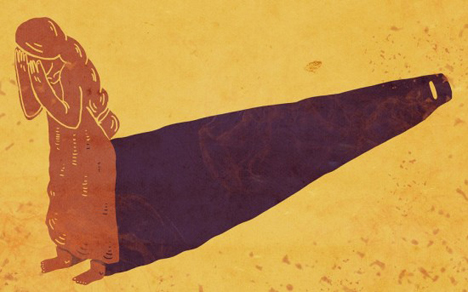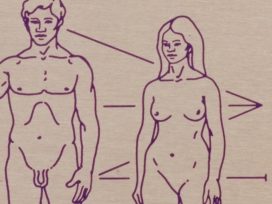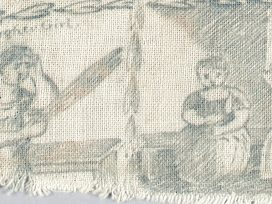Jaroslaw Kuisz: Reviewing a book by Martha Nussbaum The New Religious Intolerance, you accused the author of ignoring the problem of violence against women by incorrectly interpreting the cultural habits of Muslims in France. You wrote that accusing France of Islamophobia hides a lack of capabilities in fighting discrimination against Muslim women.
Alain Finkielkraut: Attempts, which are currently fashionable, to equalize violence against women in the West and the religiously and traditionally sanctioned subjugation of women in the Muslim world are proof of ignorance and shameless lies.
JK: Why?
AF: Because of the position of women in French society, which they achieved even before the Revolution. It is not possible to describe the public sphere in France without taking into account the role of women. They are present, their beauty is celebrated, they are not being kept hidden. They constitute a vivid accent to social life, they add charm to the world through their coquetry. At the same time, in many Muslim societies, emancipated women are still seen as prostitutes.
JK: Aren’t you exaggerating?
AF:These women are badmouthed, teased, abused. That is their everyday reality. Violence and sexual frustration is the reality of women in Muslim societies. For that reason, comparing it to the French reality is pointless. It results from a very common will to accuse the West and absolve all other cultures.
In her book, Martha Nussbaum argues that the bias in relation to one’s own way of living, civilization and culture to which one belongs, is the archetype of a “moral sin”. That’s the whole crux of the argument. In other words: you live in France, but the French civilization does not have any kind of sovereign power, there is no primacy of culture in relation to the newcomers. There is no such thing as the nation. There is no such thing as the way of thinking, the lifestyle, there are no reference points and values that are to be respected by everyone. Meanwhile, in my opinion, equalizing all communities living in the same space is an attack on the culture of the host country. This is probably entangled in the American myth of a “multicultural” utopia, which does not bring peace, but – at its best – brings cultural separatism and – at worst – civil war.
JK: Who would start this war?
AF: If such a war broke out, Nussbaum would probably charge with responsibility those who ran out of politeness to agree on the Islamic headscarf, on food coming from ritual slaughter of animals, on burqa that covers the entire body. She would be explaining that if some women wanted to wear a burqa, covering them completely, then the violence within the Muslim community that I was talking about does not exist. I think that interpreting cultural and religious behaviour from this perspective is a mistake, and even an insult to women. Permission to wear the burqa means an acceptance of the sufferings of French citizens, a violation of their rights.
JK: Why?
AF: Because uncovering the woman’s face is enough to arouse the men. Paradoxically, it is the burqa that transforms the woman into a sexual object. And no woman agrees with such a degrading image. So when a French woman sees a woman in a burqa, she both feels for her because of the subjugation, even if voluntary, and revolts against such an image. One has to live completely under the illusion of analytical philosophy not to get it.
JK: The objectification of women, which you associate with Muslims, is not unique to religious fundamentalism. In western culture we come across many practices that can be seen similarly, such as the cult of the body and widespread plastic surgery. Fashion is also a form of constraint for women – a purely secular limitation.
AF: Indeed, but the context is different. Afghan women in burqas don’t have access to education, they are excluded from public life. There is a completely different weight and social meaning to clothing. Could the misguided transfer of this model to France be called tolerance? In Europe, the burqa symbolizes the systemic degradation of women.
JK: Nussbaum claims that French cultural policy is anachronistic and to change it would serve security on the streets. A lot of unrest and rioting in France has been caused by the immigrant youth.
AF: Damn security! This concept, promoted as so-called universal, is superficial and sheared of its local context. Covering one’s face equals taking this face away. Veiling is an offence against humanity. Dehumanization cannot be the foundation for a social order! The multicultural model of society – either in the French or American sense – hasn’t worked out. We’re dealing with the most violent societies. Part of the Islamic world has declared war on Europe, on her values and her civilization. This is the reality. Concealing this reality with the imperative for impartiality and the denouncement of xenophobia is ridiculous.
JK: In Nussbaum’s opinion, acculturation has to be a process of mutual adjustment. For this reason alone we need to adapt to Muslims, rather than simply lecture them on who we are… otherwise we will radicalize even the moderate Islamists.
AF: France is the host country, therefore the guest should adhere to local customs. Perhaps it’s different in the US, but here it’s clear. Strangers should adapt to us, not the other way round. This is not about divesting one’s identity. We do not want to convert Muslims to being non-religious. They are free to erect mosques and places of worship – of which there are more than there are churches and synagogues these days. Bear in mind the evident asymmetry – in Arabic countries there are hardly any churches. So there is space for Islam in Europe, definitely more of it than for Christianity or Judaism in the Middle East and the Maghreb. But the Muslims who came to France have to adapt to French civilization. If they don’t like it, they can move somewhere else. France is not only a state – it’s a magnificent culture. Beautiful language, literature, outstanding landscapes – all it has on offer is unique. Accepting all this entails being bound by public law. The Republic may now require from the Muslims what was required of the Catholics years ago.
JK: If I understand you correctly, you completely reject mutual cultural adaptation.
AF: Concessions for Muslims would constitute a redundant precedent in the history of France. Public authorities have a monopoly on exerting legal violence – usurpation of this right, oppression of Muslims by Muslims, is a blatant violation of the constitutional order. In any case, France does not require renunciation of Islam, but that it holds less control over the lives of its followers. Truth be told, I do not think this is too much to ask. After all, you know that in Islam, the rejection of the faith carries capital punishment. A republic cannot accept this. A Muslim has to have the right to convert to another religion. Acceptance of the Republican law does not deprive the Muslim of freedom, but broadens it – without threatening the reason of state.
JK: The second generation of migrants – people born in France – has already manifested other aspirations. They do not believe in France as the land of milk and honey and consequently cease to see the purpose of adaptation.
AF: Therefore it is crucial to set the rules at the very beginning. And stigmatize any violation. Otherwise France will become the blurred land of jihadism.
Making a concession, allowing the Islamization of Muslim- dominated neighbourhoods, would be a fatal mistake. Imagine we allow the burqa to be worn at school, then we change the curriculum, rejecting potentially offensive content – such as the history of cathedrals, or perhaps Christian Middle Ages as a whole… What is left? Nothing! We cannot become dependent for the sake of adaptation.
JK: The activity of socializing institutions – schools, families – based on religious authority is not as obvious as you claim. According to research carried out in the US, there is more violence in “traditional” American families than in Muslim ones.
AF: Sociologists manipulate data because of political correctness. Islam has to be untouchable.
JK: In France too?
AF: Of course! This kind of discourse is completely ridiculous and scandalous. Even if we agree with the opinion that the education system in France is in crisis, it does not mean we should be grateful to people who want to demolish it. Reform cannot mean that the institution should be subordinate to the principle of the strongest or the most numerous. This is sheer cowardice disguised as morality, anti-racism and open-mindness. I am strongly against such attempts. There is no place for multiculturalism in France. We have an obligation to preserve domestic culture and pass it on the next generations. France has chosen the republican model.
JK: Aren’t you afraid that – if policy on migrants doesn’t change – the situation from a decade ago will recur? In 2005 riots spread over Paris, Nantes, Rennes, Rouen, Lille, Toulouse and Lyon.
AF: Riots don’t break out for that reason! Quite the contrary. The more concessions we make, the more riots break out. It is a cry of hate towards the civilization that we want to benefit from and which we have already tasted. Peace is certain only when the majority decides about the form that the social order takes. People need at least a minimum of homogeneity in order to facilitate common existence.
JK: In your book that was published a year ago and gained great popularity, entitled L’identité malheureuse, you criticize the concept of cosmopolitanism. How – in the context of your theses – should we judge the victory of the rightwing Front National in the May elections?
AF: Well, the French have always sought parties with a clear ideological identity. I don’t demonize the electorate of the Front National. I understand them, but I think that the causes of the success of the Front lie elsewhere. The secularity, integration and assimilation issues should be the concern of centre and leftwing politicians, but they gave them away to the opposition. After all, France has something to offer and the large republican groups should remind us that this is the case. What Martha Nussbaum would recognize as a certain form of dominance, is actually a gift. But also a challenge – which Marine Le Pen doesn’t handle. I don’t accept the racism that emerges from her statements the same way I don’t believe in multiculturalism. I hope for a true and authentic, reflective and self-critical hospitality. That’s why I didn’t vote for Front National.
JK: Do you think that French civilization is prone to self-criticism?
AF: It is constantly subjected to self-criticism. It is one of the essential dimensions of European civilization, and the key to understanding the identity of Europeans. Healthy scepticism sets us apart from the Muslims. The capacity for self-criticism should not – as the Mexican essayist Octavio Paz once wrote – fall to the level of moralizing masochism that I find in the books of Martha Nussbaum. Acceptance of her diagnosis would mean remaining in crisis, and probably the deepening of the crisis. Today, it is worth raising once again questions such as: are we heading towards a clash of civilizations, or can this be avoided? Will Muslims agree on adopting European standards, or will hatred take hold?
Take a look at what is now the memory of the Holocaust. The European peace project was founded on the awareness of this painful history. Currently, the Jews do not feel entirely safe in the Old World. And it is not about old European anti-Semitism, but about a new type of anti-Semitism. It was manifested in the attack on the Jewish Museum in Brussels two months ago or the attack on a school in Toulouse in March 2012. What is being done to avoid it? How to react? How to prevent it? This is the problem that is facing Europe and that Europe must solve immediately. I do not see any more pressing problem that is able to lead to the mobilization of European forces.
JK: Such mobilization is hard to imagine when the extreme rightwing parties are given legitimate power in many European countries.
AF: I find it hard to define the causes of their success. Perhaps Europeans want to remain European, recover their continental identity. Weird, isn’t it? Perhaps they want more democracy? It’s not about “escaping freedom”, a Renaissance of fascism. Front National voters wish for some sovereignty that they find for instance in migration control. They think Europe is being devastated by inefficient bureaucracy and that the continent no longer believes in modernization. They lack a sense of security. They want to be down to earth instead of subject to constant change. We’re all human beings, but Brussels treats us – as Zygmunt Bauman called it – as “liquid life”, undefined, diffuse liquidity. People prefer something substantial!
This article first appeared in a series of issues of Kultura Liberalna, in cooperation with the The Centre for French and Francophone Studies at the University of Warsaw.






